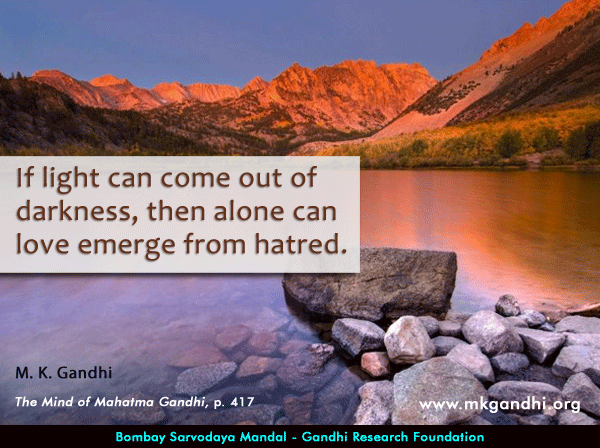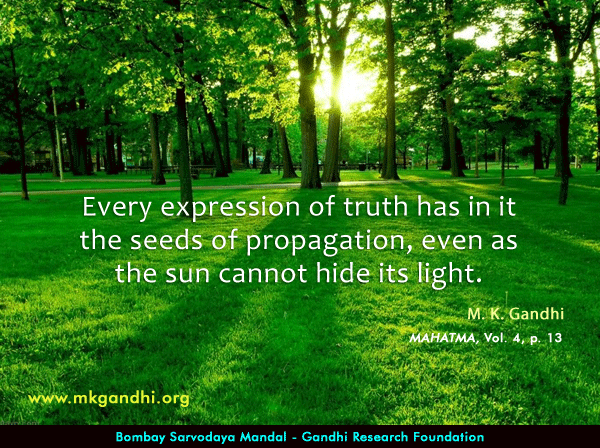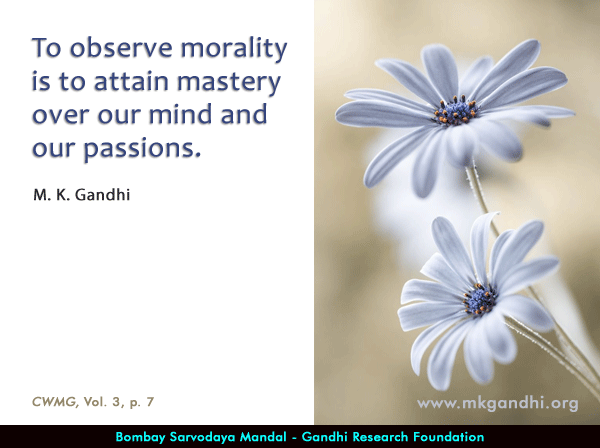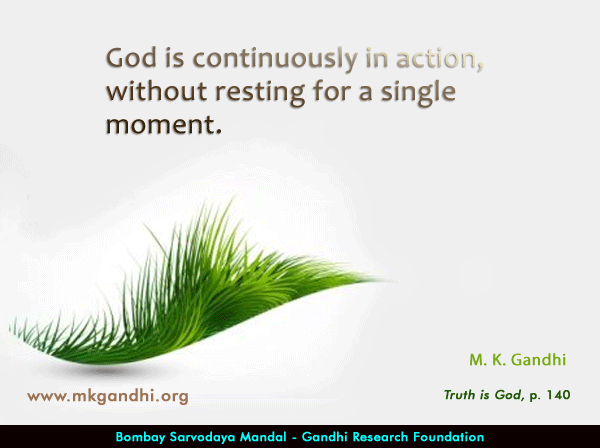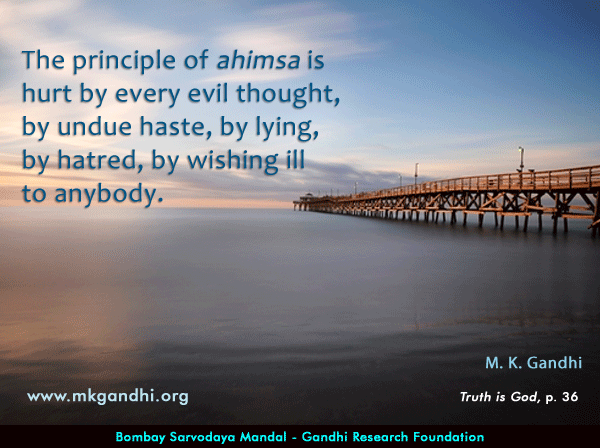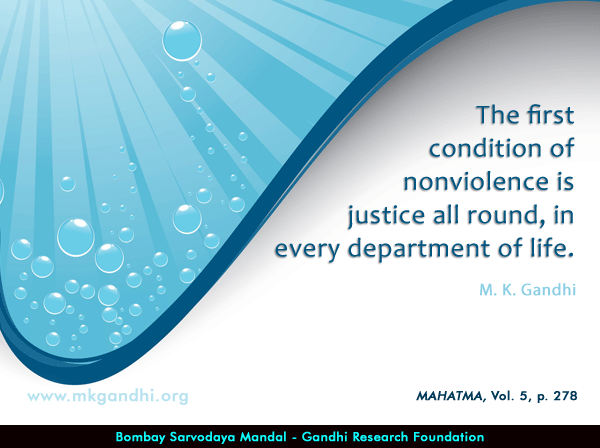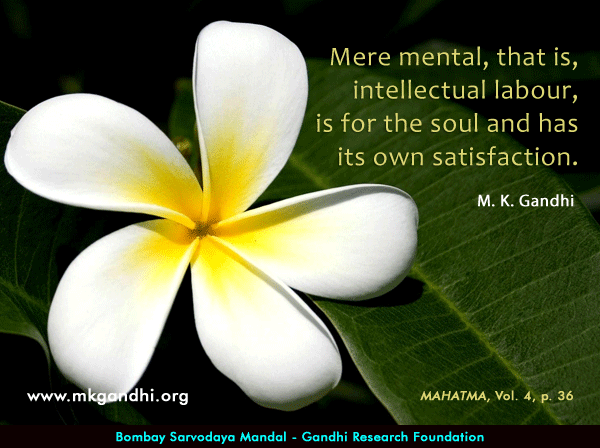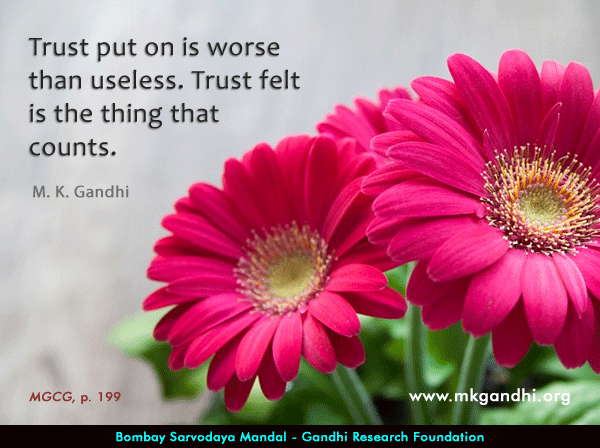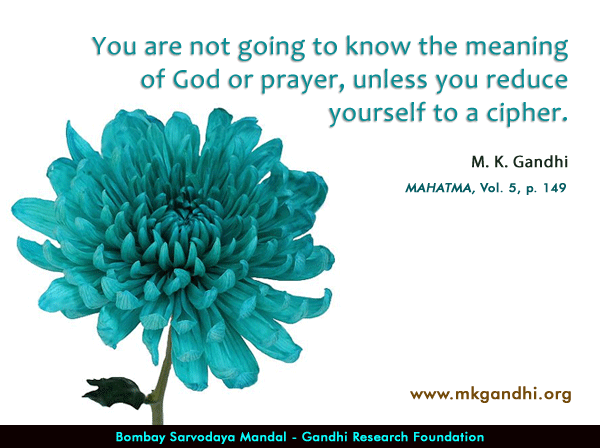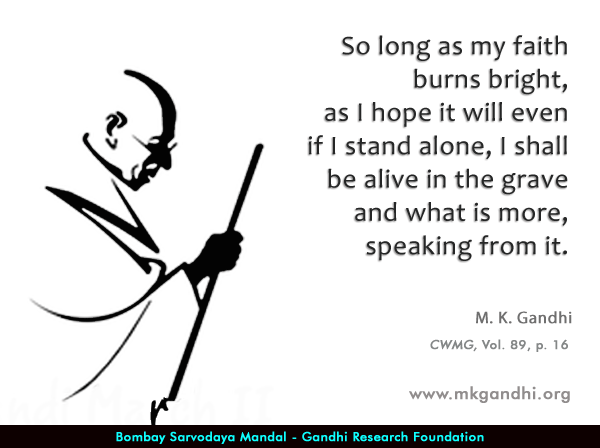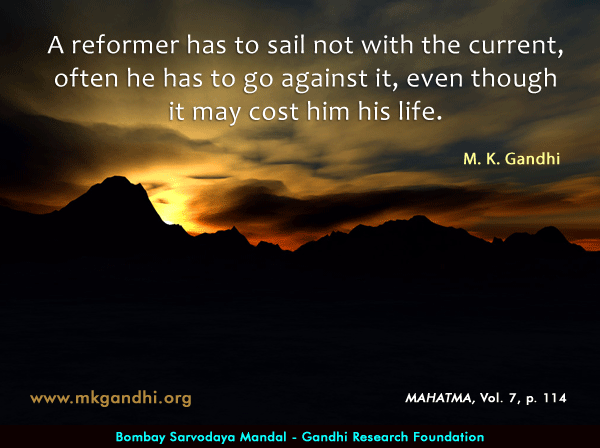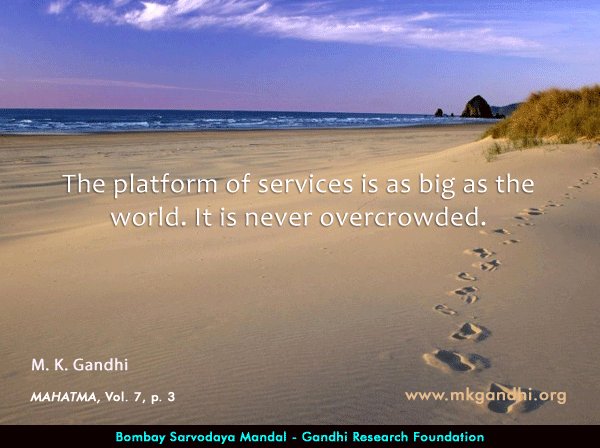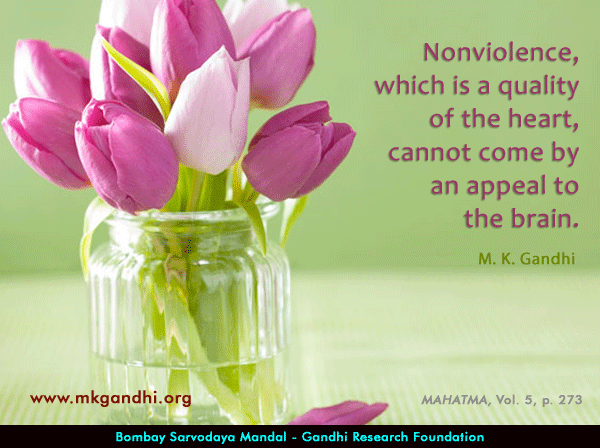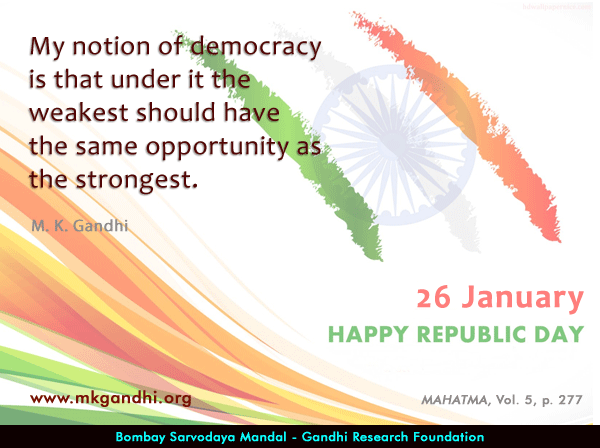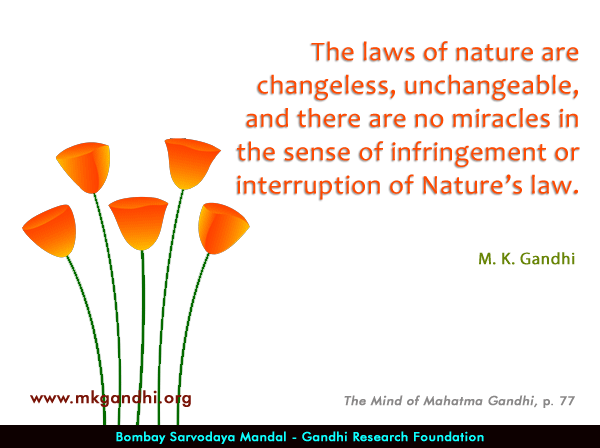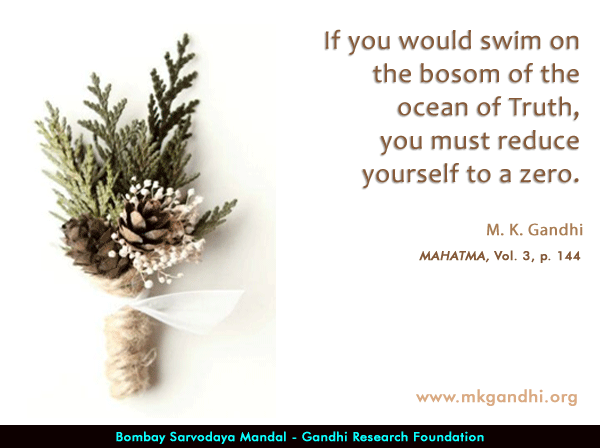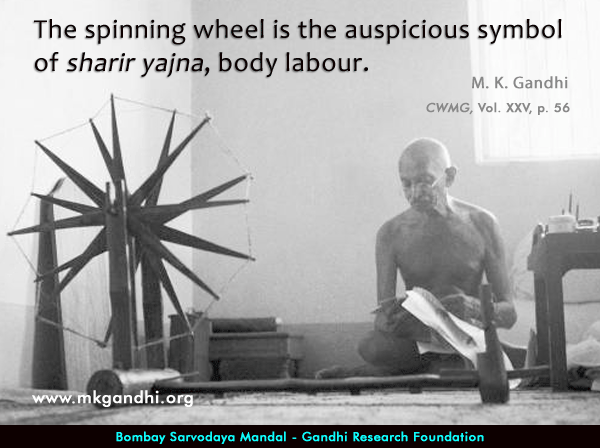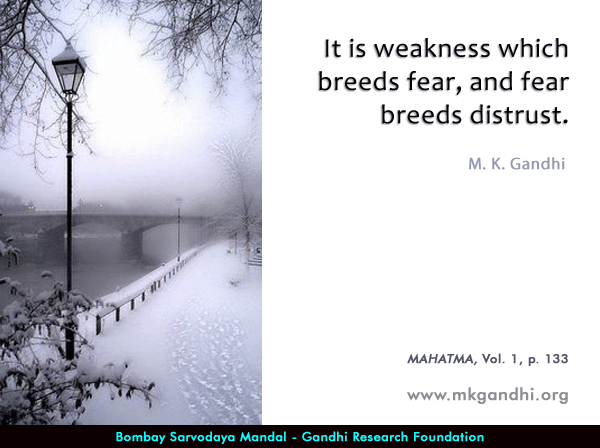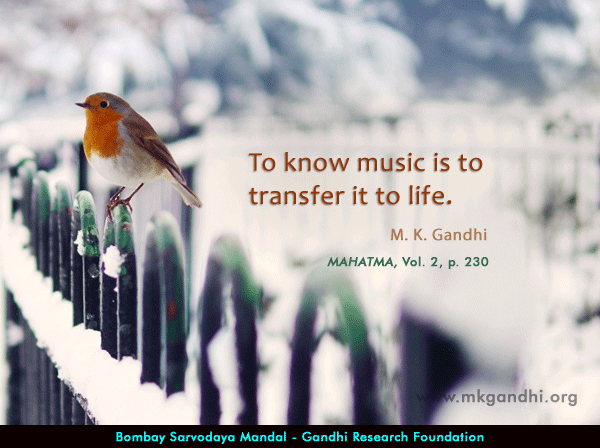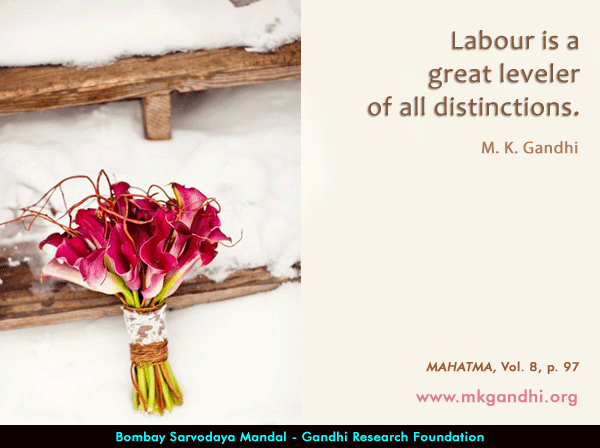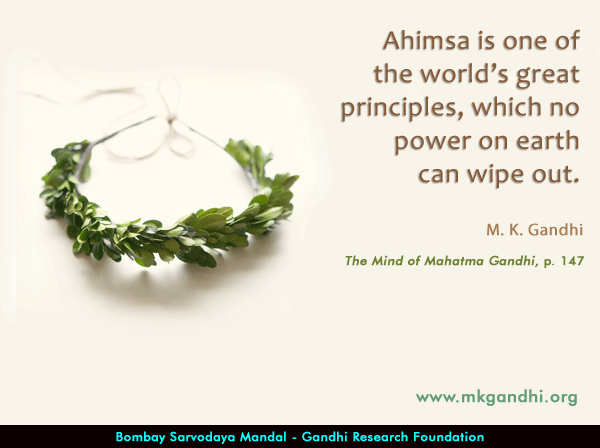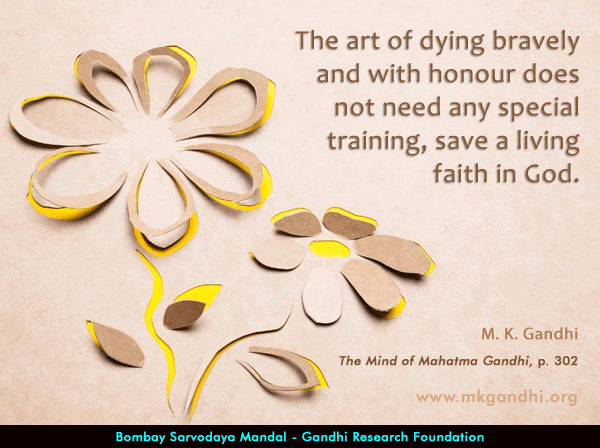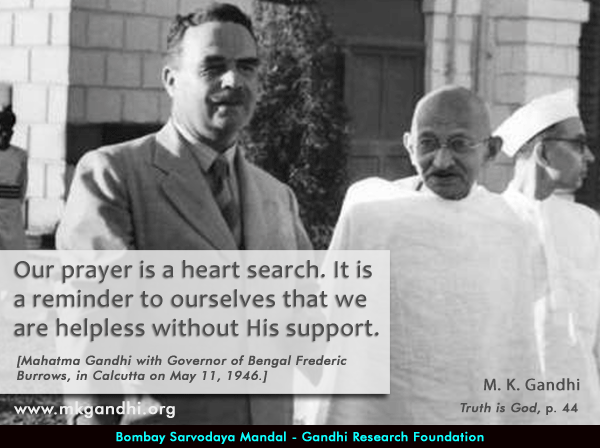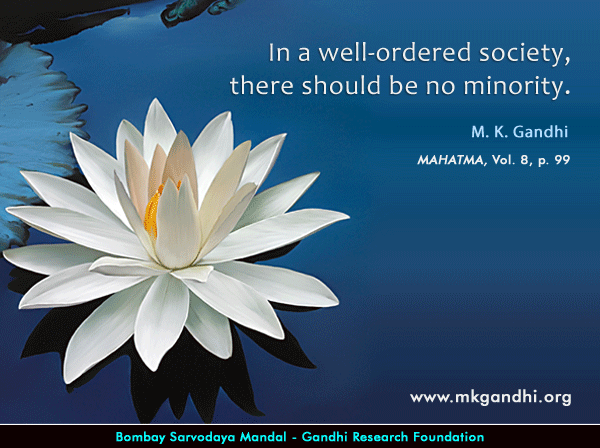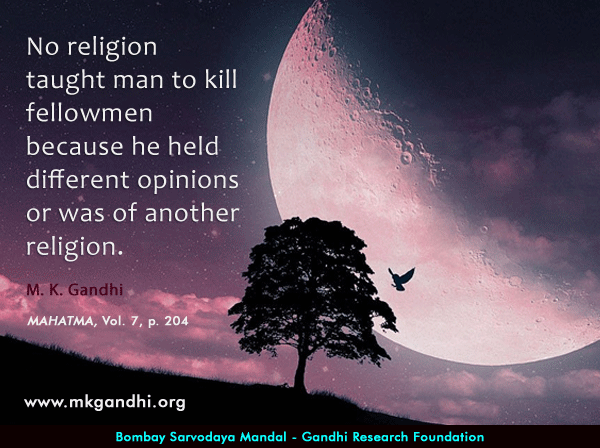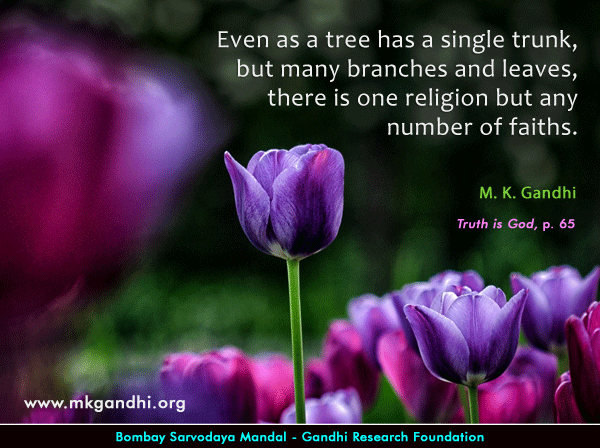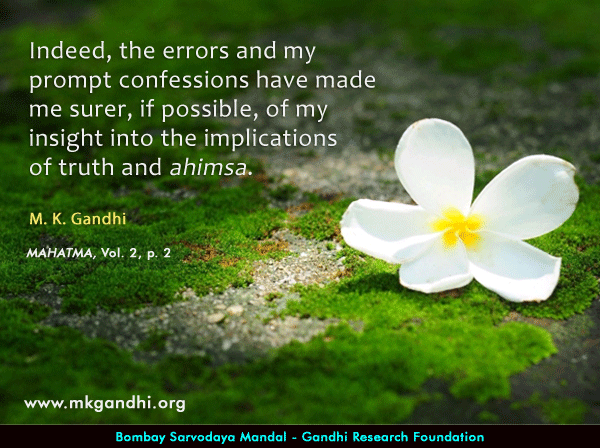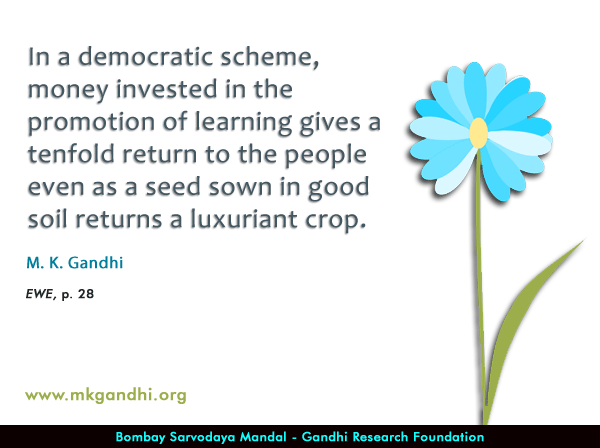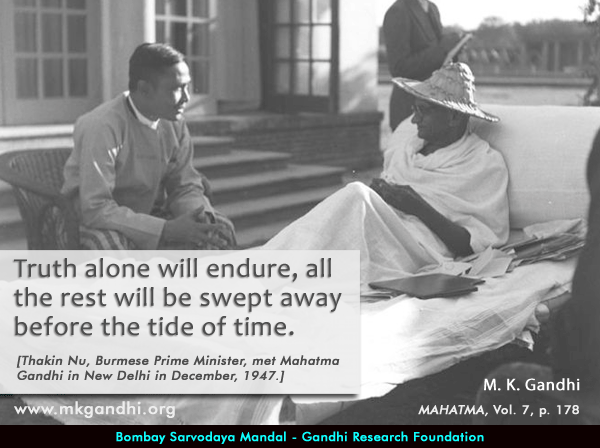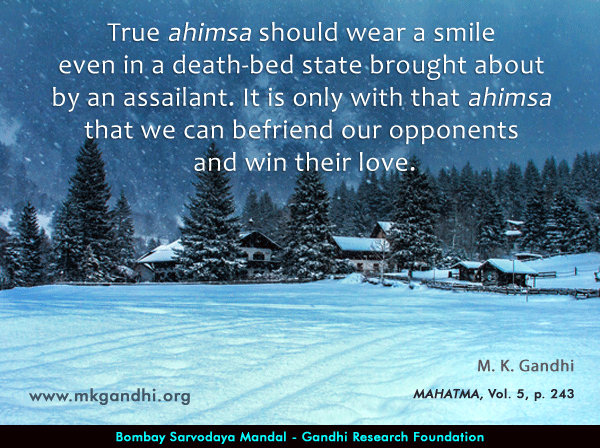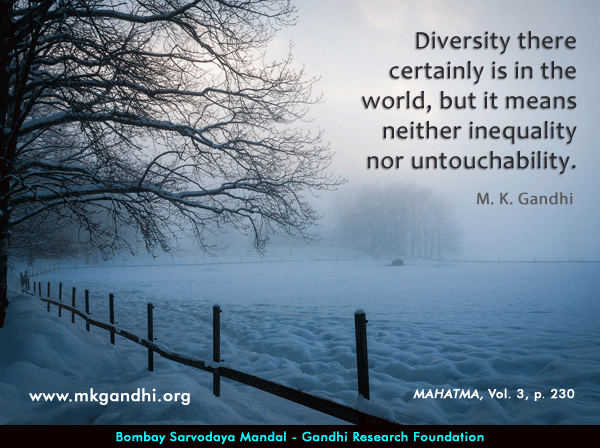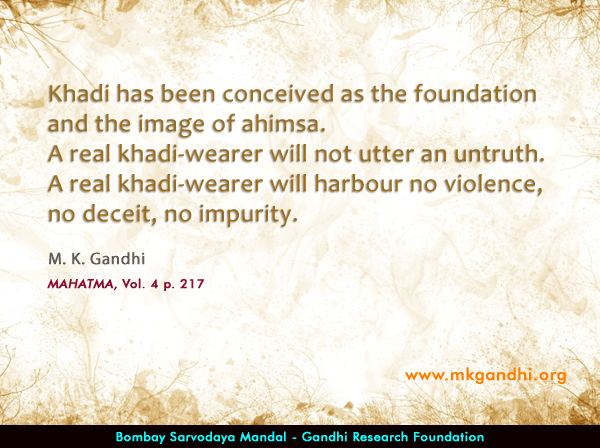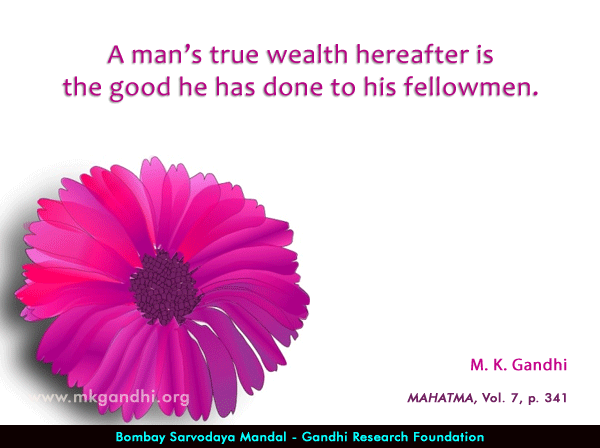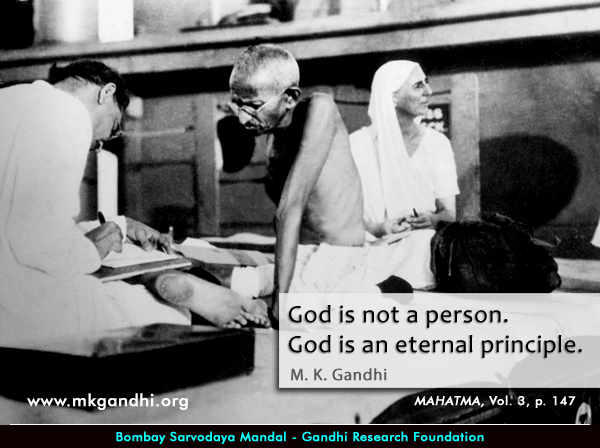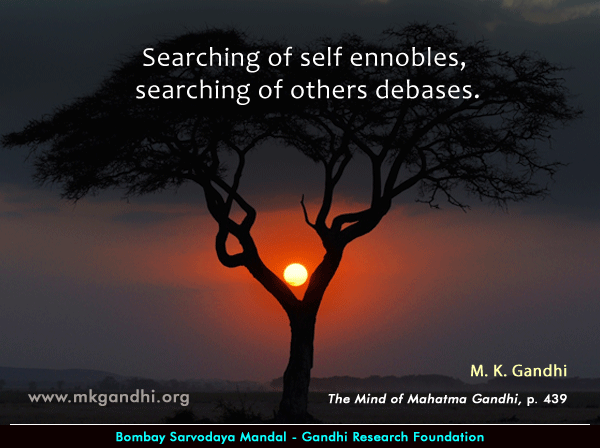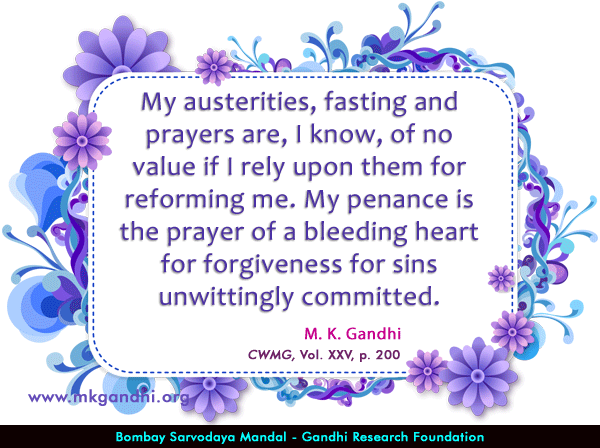Gandhi in Bombay is interspersed with the Mahatma’s letters, speeches, published writings and 50 rare photographs depicting important events in Bombay. Together they project a scintillating vision of the city in the throes of the independence movement.
Saturday, February 11, 2017
Friday, February 10, 2017
Wednesday, February 8, 2017
Participation of youngsters boosts sale of Gandhi books
Participation of youngsters boosts sale of Gandhi books
Week-long exhibition-cum-sale of Gandhi Books organized by Bombay Sarvodaya Mandal to commemorate 69th Gandhi death anniversary
Week-long exhibition-cum-sale of Gandhi Books organized by Bombay Sarvodaya Mandal to commemorate 69th Gandhi death anniversary
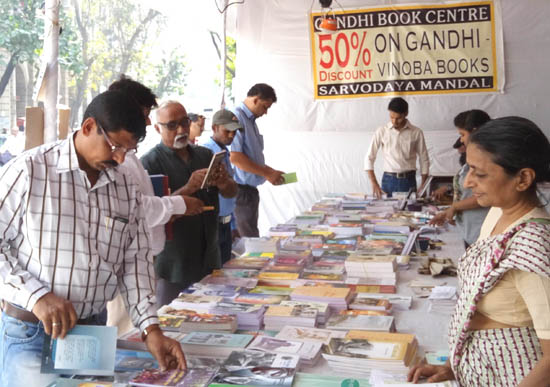
The exhibition-cum-sale of books on and by Mahatma Gandhi, organised recently by the Bombay Sarvodaya Mandal and Gandhi Book Centre, has received good response with books worth Rs 2.12 lakh having been sold between January 30 and February 4.
Financial assistance has been provided for the initiative by Babulnath Mandir Charities and Mahalaxmi Mandir Charities.
The exhibition-cum-sale received overwhelming response from the readers as the books worth about Rs 2.12 lakh were sold during the six days.
Books in four languages viz. English, Hindi, Marathi, and Gujarati were sold at the exhibition. In the present world of modern technologies like iPhone, tabs and e-books, it is difficult to believe that many people are still interested in buying Gandhi books. The sale proves that Gandhiji's teachings are relevant than ever.
Tuesday, February 7, 2017
Monday, February 6, 2017
Saturday, February 4, 2017
Friday, February 3, 2017
Thursday, February 2, 2017
Wednesday, February 1, 2017
Tuesday, January 31, 2017
Monday, January 30, 2017
The Last Day of Mahatma Gandhi
The Last Day Of Mahatma Gandhi
V Kalyanam

Mahatma Gandhi arrived in Delhi on Tuesday, 9 September 1947, from Calcutta. He was staying in Birla House at Albuquerque Road (now renamed Tees January Marg—30th January Road). A large carpeted room with an attached toilet was placed at his disposal for use by his entourage. This was an all-purpose room in the ground floor of the huge mansion. A thick cotton mattress and a huge pillow to recline, with a desk in front, was placed in one corner of the room. At the other end was a table and chair piled with correspondence. Gandhiji usually spent the whole day here attending to his correspondence, talking to people, spinning his charkha and taking his midday siesta. There was also a balcony, fully enclosed with glass doors, adjoining the room where he would sleep at nights on the carpeted floor, along with the rest of us.
Friday, 30 January 1948, dawned like any other day. We never knew what was going to happen in the evening. We got up as usual for our prayers at 3.30. We went about our daily routine with no thought about what the day had in store for us. Gandhiji roused his grand niece Abha to get up.
After his ablutions, Gandhiji came out of the toilet and squatted on the mattress. We sat before him. Gandhiji’s day always commenced with prayer. He described prayer as the key of the morning and bolt of the evening. His prayers included recitations from the scriptures of all religions, particularly Hindusim and Islam, in order to stress the essential unity of all religions.
(V Kalyanam, personal secretary to Mahatma Gandhi, recounts Friday, January 30, 1948, moment-by-moment—the day when the Mahatma was shot. V Kalyanam was just behind Gandhi when Naturam Godse fired his shots.)
Sunday, January 29, 2017
Saturday, January 28, 2017
Discounted sale of Gandhi's books begins on Jan 30
Discounted sale of Gandhi's books begins on Jan 30
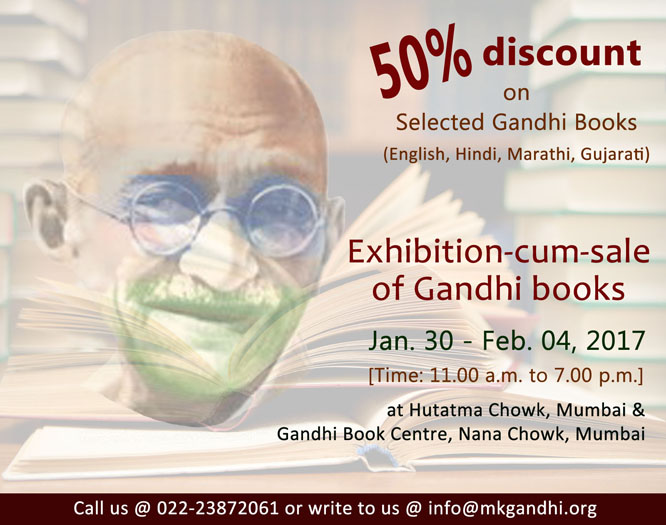
Various books on and by Mahatma Gandhi will be available for sale at discounted prices to mark his 69th death anniversary which falls on January 30.
The books will be available at a stall at Hutatma Chowk in Fort area and at Gandhi Book Centre in Nana Chowk, Mumbai.
...Top-selling books like 'An Autobiography' of Mahatma Gandhi worth Rs. 80/- will be available at Rs. 40/- and 'Selected Works of Mahatma Gandhi', which is a set of five books running into 2,500 pages, for Rs. 300/-
The books will be available at a stall at Hutatma Chowk in Fort area and at Gandhi Book Centre in Nana Chowk, Mumbai.
...Top-selling books like 'An Autobiography' of Mahatma Gandhi worth Rs. 80/- will be available at Rs. 40/- and 'Selected Works of Mahatma Gandhi', which is a set of five books running into 2,500 pages, for Rs. 300/-
Friday, January 27, 2017
Thursday, January 26, 2017
Wednesday, January 25, 2017
Tuesday, January 24, 2017
Monday, January 23, 2017
Saturday, January 21, 2017
Friday, January 20, 2017
Thursday, January 19, 2017
Wednesday, January 18, 2017
Tuesday, January 17, 2017
Monday, January 16, 2017
Sunday, January 15, 2017
Saturday, January 14, 2017
Friday, January 13, 2017
Thursday, January 12, 2017
Wednesday, January 11, 2017
Tuesday, January 10, 2017
New Book Published: GANDHI in BOMBAY: Towards Swaraj
Written By: Usha Thakker, Sandhya Mehta
Foreword by: Bhikhu Parekh
First Published : 30th December, 2016
Price : Rs. 795/-
Published by : Oxford University Press, India.
About the Book:
READ BOOK REVIEW
Monday, January 9, 2017
Sunday, January 8, 2017
Saturday, January 7, 2017
Friday, January 6, 2017
Gandhi Journal Article-II ( January 2017 ) - MAHATMA GANDHI : A real friend
Gandhi Journal Article-II ( January 2017 )
MAHATMA GANDHI : A real friend
By The Earl Mountbatten of Burma
In the course of my life I have had the good fortune to get to know many of the world's leaders and in my career to have served with many men of outstanding talent. In the long catalogue I recall only a few that I would describe without hesitation as truly great men. I have no hesitation however in placing Mahatma Gandhi in this very short list of the elect of our times.
I only came into contact with him at the end of his life at a point when, in political terms at any rate, his power was beginning to wane or at least he was withdrawing from the front line of responsibility. The unavoidable accent on partition in the Transfer of Power meant a bitter frustration of his life-long aims and ideals—to him it appeared more as vivisection than victory. In such circumstances of partial eclipse he might have left a blurred impression, or appear to have done so; but from the first encounter my wife and I were both aware that here was a unique personality, one whose authority transcended the normal bounds of human leadership; one who quickly became a real friend.
I only came into contact with him at the end of his life at a point when, in political terms at any rate, his power was beginning to wane or at least he was withdrawing from the front line of responsibility. The unavoidable accent on partition in the Transfer of Power meant a bitter frustration of his life-long aims and ideals—to him it appeared more as vivisection than victory. In such circumstances of partial eclipse he might have left a blurred impression, or appear to have done so; but from the first encounter my wife and I were both aware that here was a unique personality, one whose authority transcended the normal bounds of human leadership; one who quickly became a real friend.
Thursday, January 5, 2017
Wednesday, January 4, 2017
Tuesday, January 3, 2017
Gandhi Journal Article-I ( January 2017 ) - Trusteeship
Gandhi Journal Article-I ( January 2017 )
Trusteeship
By Dhiru Mehta
The business community hailed the economic policy of liberalization and globalization first enunciated by Manmohan Singh in 1991 as finance Minister of our country in the Government of P. V. Narasimha Rao. The same policy continued to guide the later governments. In the thinking on economic policy and matter there is no substantial difference between the different governments. Our country has practiced socialist economic policies for 40 years from 1951 to 1992. Since then the governments have been following policies of liberalization and globalization. At the advent of independence, the combined population of India then consisting of present India, Pakistan and Bangladesh was around 40 crores. Today the people living below poverty line in India alone are over 42 crores. It is reported that 1% of the population of the world would 99% of the resources of its wealth by 2016. The case of India is not much different. This clearly shows that neither socialism nor liberalization is the correct instruments for the economic growth and prosperity of this country. For solving countries economic problems one has to accept Gandhi’s economic solutions. Pandit Nehru realized it in his last days, which was too late for him to change the course. Advocates of present economic policy are getting highly intoxicated. The one of the idea of Gandhi’s economics was the concept of “Trusteeship”.Monday, January 2, 2017
Sunday, January 1, 2017
Saturday, December 31, 2016
Friday, December 30, 2016
Thursday, December 29, 2016
Gandhi’s interview with Nirmal Kumar Bose* (On Trusteeship)
Gandhi’s interview with Nirmal Kumar Bose* (On Trusteeship)
Q. Is love or non-violence compatible with possession or exploitation in any shape or form? If possession and nonviolence cannot go together, then do you advocate the maintenance of private ownership of land or factories at an unavoidable evil which will continue so long as individuals are not ripe or educated enough to do without it? If it be such a step, would it not be better to own all the land through the State and place the State under the control of the masses?
A. Love and exclusive possession can never go together. Theoretically when there is perfect love, there must be perfect non-possession. The body is our last possession. So a man can only exercise perfect love and be completely dispossessed, if he is prepared to embrace death and renounce his body for the sake of human service.
But that is true in theory only. In actual life, we can hardly exercise perfect love, for the body as a possession will always remain with us. Man will ever remain imperfect, and it will always be his part to try to be perfect. So that perfection in love or non-possession will remain an unattainable ideal, as long as we are alive, but towards which we must ceaselessly strive.
Those who own money now are asked to behave like trustees holding their riches on behalf of the poor. You may say that trusteeship is a legal fiction. But if people meditate over it constantly and try to act up to it, then life on earth would be governed far more by love than it is at present. Absolute trusteeship is an abstraction like Euclid’s definition of a point, and is equally unattainable. But if we strive for it, we shall be able to go further in realizing a state of equality on earth than by any other method.
Q. If you say that private possession is incompatible with nonviolence, why do you put up with it?
A. That is a concession one has to make to those who earn money but who would not voluntarily use their earnings for the benefit of mankind.
Q. Why then not has State-ownership in place of private property and thus minimize violence?
A. It is better than private ownership. But that too is objectionable on the ground of violence. It is my firm conviction that if the State suppressed capitalism by violence, it will be caught in the coils of violence itself, and will fail to develop nonviolence at any time. The State represents violence in a concentrated and organized form. The individual has a soul, but as the State is a soulless machine, it can never be weaned from violence to which it owes its very existence. Hence I prefer the doctrine of trusteeship.
Q. Let us come to a specific instance. Supposing an artist leaves certain pictures to a son who does not appreciate their value for the nation and sells them or wastes them, so that the nation stands to lose something precious through one person’s folly. If you are assured that the son would never be a trustee in the sense in which you would like him to be, do you not think the State would be justified in taking away those things from him with the minimum use of violence?
A. Yes, the State will, as a matter of fact, take away those things, and I believe it will be justified if it uses the minimum of violence. But the fear is always there that the State may use too much violence against those who differ from it. I would be very happy indeed if the people concerned behaved as trustees; but if they fail, I believe we shall have to deprive them of their possessions through the State with the minimum exercise of violence. That is why I said at the Round Table Conference that every vested interest must be subjected to scrutiny, and confiscation ordered where necessary with or without compensation as the case demanded.
What I would personally prefer would be not a centralization of power in the hands of the State, but an extension of the sense of trusteeship; as in my opinion the violence of private ownership is less injurious than the violence of the State. However, if it is unavoidable, I would support a minimum of State-ownership.
Q. Then, sir, shall we take it that the fundamental difference between you and the Socialists is that you believe that men live more by self-direction or will than by habit, and they believe that men live more by habit than by will; that being the reason why do you strive for self-correction while they try to build up a system under which men will find it impossible to exercise their desire for exploiting others?
A. While admitting that man actually lives by habit, I hold that it is better for him to live by the exercise of will. I also believe that men are capable of developing their will to an extent that will reduce exploitation to a minimum. I look upon an increase of the power of the State with the greatest fear, because although while apparently doing good by minimizing exploitation, it does the greatest harm to mankind by destroying individuality, which lies at the root of all progress. We know of so many cases where men have adopted trusteeship, but none where the State has really lived for the poor.
Q. But have not those cases of trusteeship which you sometimes cite been due to your personal influence rather than to anything else? Teachers like you come infrequently. Would it not be better, therefore, to trust to some organization to effect the necessary changes in man, rather than depend upon the casual advent of men like yourself?
A. Leaving me aside, you must remember that the influence of all great teachers of mankind has outlived their lives. In the teachings of each prophet like Mohammed, Buddha or Jesus, there was a permanent portion and there was another which was suited to the needs and requirements of the times. It is only because we try to keep up the permanent with the impermanent aspects of their teachings that there is so much distortion in religious practice today. But that apart, you can see that the influence of these men has sustained us after they have passed away. Moreover, what I disapprove of is an organization based on force which a State is. Voluntary organization there must be.
The Hindustan Times, 17-10-1935
-----------------------------------------------------------------------------------
*Nirmal Kumar Bose met Gandhi on November 9 and 10, 1934. The report was published after correction by Gandhi.
असहयोग आंदोलन
असहयोग आंदोलन
गांधी के अफ्रीका से भारत आने के पांच साल भी
नहीं हुए थे भारतीय राष्ट्रीय कांग्रेस की कमान पूरी तरह गांधी के हाथ में आ गयी
थी | पूर्व से पश्चिम और उत्तर से
दक्षिण तक कहीं भी किसी बडे आंदोलन की जरूरत हो हर तरफ गांधी के नेतृत्व की बात
उठती थी | कहने के
लिए पंजाब में लाला लाजपत राय, बम्बई में लोकमान्य तिलक,
कलकत्ता में देशबंधु, मद्रास में राजाजी और
इलाहाबाद में मोतीलाल नेहरू आदि बहुत से नेता सक्रिय थे लेकिन खेडा से लेकर चंपारन
तक के आंदोलन में जैसी सफलता गांधी को मिली थी वैसी 1885 में
कांग्रेस के बनने से 1915 में गांधी के आने तक कभी नहीं मिली
थी |
गांधी के आने का सबसे बडा लाभ कांग्रेस को यह
हुआ था कि गांधी की वजह से आम भारतीय कांग्रेस से गहरे जुडने लगे थे | यही कारण था कि गांधी के आव्हान पर 1920 में
देशव्यापी असहयोग आंदोलन की शुरुआत हुई थी जिसने पूरे देश को एक सूत्र में जोड़ कर
अंग्रेजी शासन को ऐसी ऐतिहासिक चुनौती दी थी जिसकी उसने कल्पना भी नहीं की थी
| कांग्रेस के 1920 के नागपुर अधिवेशन में अहिंसक मार्ग से स्वराज प्राप्ति का लक्ष्य रखा गया
था | इसके बाद पूरे
देश में असहयोग आंदोलन की जबरदस्त लहर चल पडी थी | इसी दौरान 1 अगस्त 1920 को तिलक की मृत्यु हो गई थी | बम्बई की चौपाटी पर उनका अदभुत दाह संस्कार हुआ था जिसमें अपने प्रिय नेता
को अंतिम श्रद्धांजलि देने के लिए बेतहासा भीड़ जुटी थी | "स्वराज मेरा जन्म सिद्ध
अधिकार है " नारा देने वाले तिलक के काम को आगे बढ़ाने के लिए गांधी ने स्वराज
फंड में एक साल के अंदर एक करोड़ की बडी दान राशि जुटाने का लक्ष्य रखा था
| कठिन दिखाई देता यह
लक्ष्य भी गाँधी और उनके साथियों के सहयोग से समय रहते पूरा हो गया था | कलकत्ता से 31 जुलाई 1921 को तार से देशबंधु ने सूचित किया था कि
बंगाल से 15 लाख मिलने से लक्ष्य से अधिक राशि एकत्र हो गई
है | गांधी की
लोकप्रियता का यही आलम था कि पारस की तरह वह जिस काम में हाथ डालते वह तदनुरूप
पूरा हो जाता था |
असहयोग आंदोलन में नेता और जनता दिल खोल कर
समर्थन दे रहे थे | नेताओं में त्याग और सादगी की
होड़ लगी थी मानो इन दो मूल्यों में सब एक दूसरे से आगे निकलने की कौशिश कर रहे
हैं | देशबंधु
चितरंजन दास ने वकालत के साथ कोठी और अन्य संपत्ति का त्याग कर दिया था | उनकी पत्नी वासंती देवी ने मिट्टी के बर्तन में
भात पकाया था | देश
भ्रमन के दौरान विशेष रूप से ग्रामीण देशवासियों की भयंकर गरीबी का साक्षात्कार
होने पर 21 सितम्बर 1921 में मद्रास की
सभा में गांधी ने ऊपर का वस्त्र त्याग केवल घुटने तक की आधी धोती और चप्पल पहन
स्वैच्छिक गरीबी अपनाकर सबको चौंका दिया था | इस दिन के बाद गांधी आजीवन एक
गरीब देहाती किसान और मजदूर की वेशभूषा ही पहनते रहे | यहां तक कि जब उन्हे गोलमेज
सम्मेलन में कांग्रेस का नेतृत्व करने के लिए इंग्लैंड जाना पडा तब भी उन्होंने
अपने लिबास में कोई परिवर्तन नहीं किया |
इस दौरान बिहार में चंपारन आंदोलन में अग्रनी
भूमिका निभाने वाले राजेन्द्र प्रसाद और बृजकिशोर बाबू ने भी जमीदारी छोड दी | बृजकिशोर बाबू की पुत्री प्रभावती को, जिनकी शादी
बाद में जयप्रकाश नारायण से हुई, गांधी और कस्तूरबा ने अपना
लिया | स्वदेशी
शिक्षा के विकास के लिए देश मे पांच विधापीठ अहमदाबाद, बनारस,
पटना ,पूना और दिल्ली (जामिया मिलिया) में
स्थापित की गई |
त्रिलोकी सिंह आदि विद्वानों का मानना है कि
यदि गांधी के असहयोग आंदोलन में हिंसा के कारण बीच में व्यवधान नहीं हुआ होता तो
देश 1923 में ही
आजाद हो सकता था और उस समय देशबंधु पहले प्रधान मंत्री बनते | नियति को शायद आजादी के लिए
भारतीय जनता को काफी इंतजार कराना था इसलिए असहयोग आंदोलन को अचानक बीच में ही
रोकना पडा |
- राकेश कुमार पालीवाल
rkpaliwal1986@yahoo.co.in
Subscribe to:
Posts (Atom)
